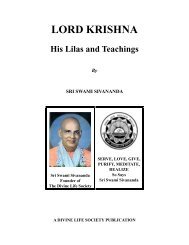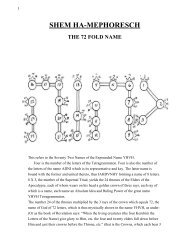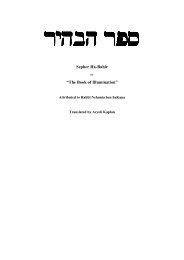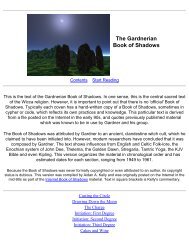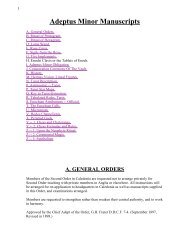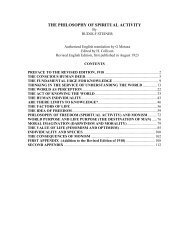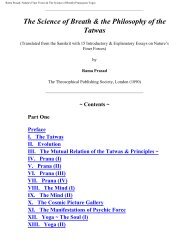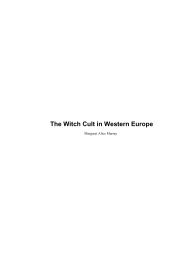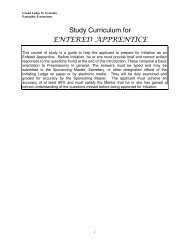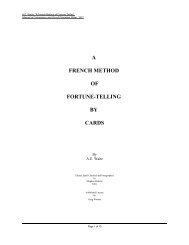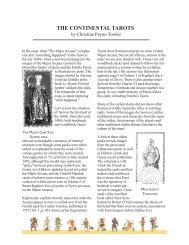Band 2 Anthropogenesis - H.P. Blavatsky
Band 2 Anthropogenesis - H.P. Blavatsky
Band 2 Anthropogenesis - H.P. Blavatsky
You also want an ePaper? Increase the reach of your titles
YUMPU automatically turns print PDFs into web optimized ePapers that Google loves.
only in speaking thus demonstrate their ignorance of that wealth of empirical sources of knowledge to which reference<br />
has already been made" ("Pedigree of Man," p. 273).<br />
We open Webster's Dictionary and read the definitions of the word "empirical": "Depending upon experience or<br />
observation alone, without due regard to modern science and theory." This applies to the Occultists, Spiritualists, Mystics,<br />
etc., etc. Again, "an Empiric -- One who confines himself to applying the results of his own observations" (only)<br />
------------------------------------------------------------------------<br />
[[Vol. 2, Page]] 665 MR. HUXLEY APPLIES AN "EXTINGUISHER."<br />
(which is Haeckel's case); "one wanting Science . . . . an ignorant and unlicensed practitioner; a quack; a CHARLATAN."<br />
No Occultist or "magician," has ever been treated to any worse epithets. Yet the Occultist remains on his own<br />
metaphysical grounds, and does not endeavour to rank his knowledge, the fruits of his personal observation and<br />
experience, among the exact sciences of modern learning. He keeps within his legitimate sphere, where he is master. But<br />
what is one to think of a rank materialist, whose duty is clearly traced before him, who uses such an expression as this:--<br />
"The origin of man from other mammals, and most directly from the catarrhine ape, is a deductive law, that follows<br />
necessarily from the inductive law of the THEORY OF DESCENT." ("Anthropogeny," p. 392).<br />
A "theory" is simply a hypothesis, a speculation, and no law. To say otherwise is only one of the many liberties taken<br />
now-a-days by scientists. They enunciate an absurdity, and then hide it behind the shield of Science. Any deduction from<br />
theoretical speculation is no better than a speculation on a speculation. Now Sir W. Hamilton has already shown that the<br />
word theory is now used "in a very loose and improper sense" . . . . "that it is convertible into hypothesis, and hypothesis<br />
is commonly used as another term for conjecture, whereas the terms 'theory' and 'theoretical' are properly used in<br />
opposition to the term practice and practical."<br />
But modern Science puts an extinguisher on the latter statement, and mocks at the idea. Materialistic philosophers and<br />
Idealists of Europe and America may be agreed with the Evolutionists as to the physical origin of man -- yet it will never<br />
become a general truth with the true metaphysician, and the latter defies the materialists to make good their arbitrary<br />
assumptions. That the ape-theory theme* of Vogt and Darwin, on which the Huxley-Haeckelians have composed of late<br />
such extraordinary variations, is far less scientific -- because clashing with the fundamental laws of that theme itself --<br />
than ours can ever be<br />
[[Footnote(s)]] -------------------------------------------------<br />
* The mental barrier between man and ape, characterized by Huxley as an "enormous gap, a distance practically<br />
immeasurable"! ! is, indeed, in itself conclusive. Certainly it constitutes a standing puzzle to the materialist, who relies on<br />
the frail reed of "natural selection." The physiological differences between Man and the Apes are in reality -- despite a<br />
curious community of certain features -- equally striking. Says Dr. Schweinfurth, one of the most cautious and<br />
experienced of naturalists:--<br />
"In modern times there are no animals in creation that have attracted more attention from the scientific student than the<br />
great quadrumana (the anthropoids), bearing such a striking resemblance to the human form as to have justified the<br />
epithet of anthropomorphic being conferred on them. . . . But all investigation at present only leads human intelligence to<br />
a confession of its insufficiency; and nowhere is caution more to be advocated, nowhere is premature judgment more to<br />
be deprecated than in the attempt to bridge over the MYSTERIOUS CHASM which separates man and beast." "Heart of<br />
Africa" i., 520.<br />
------------------------------------------------------------------------<br />
[[Vol. 2, Page]] 666 THE SECRET DOCTRINE.<br />
shown to be, is very easy of demonstration. Let the reader only turn to the excellent work on "Human Species" by the<br />
great French naturalist de Quatrefages, and our statement will at once be verified.<br />
Moreover, between the esoteric teaching concerning the origin of man and Darwin's speculations, no man, unless he is a<br />
rank materialist, will hesitate. This is the description given by Mr. Darwin of "the earliest ancestors of man."<br />
"They were without doubt once covered with hair; both sexes having beards; their ears were pointed and capable of<br />
movement; and their bodies were provided with a tail, having the proper muscles. Their limbs and bodies were acted on<br />
by many muscles which now only occasionally reappear in man, but which are still normally present in the quadrumana. .<br />
. . The foot, judging from the condition of the great toe in the foetus, was then prehensile, and our progenitors, no doubt,<br />
were arboreal in their habits, frequenting some warm forest-clad land, and the males were provided with canine teeth<br />
which served as formidable weapons. . . ."*<br />
Darwin connects him with the type of the tailed catarrhines, "and consequently removes him a stage backward in the<br />
scale of evolution. The English naturalist is not satisfied to take his stand upon the ground of his own doctrines, and, like<br />
Haeckel, on this point places himself in direct variance with one of the fundamental laws which constitute the principal<br />
charm of Darwinism . . . " And then the learned French naturalist proceeds to show how this fundamental law is broken.<br />
"In fact," he says, "in the theory of Darwin, transmutations do not take place, either by chance or in every direction. They<br />
are ruled by certain laws which are due to the organization itself. If an organism is once modified in a given direction, it<br />
can undergo secondary or tertiary transmutations, but will still preserve the impress of the original. It is the law of<br />
permanent characterization, which alone permits Darwin to explain the filiation of groups, their characteristics, and their<br />
numerous relations. It is by virtue of this law that all the descendants of the first mollusc have been molluscs; all the<br />
descendants of the first vertebrate have been vertebrates. It is clear that this constitutes one of the foundations of the<br />
doctrine. . . . It follows that two beings belonging to two distinct types can be referred to a common ancestor, but the one<br />
cannot be the descendant of the other"; (p. 106).



